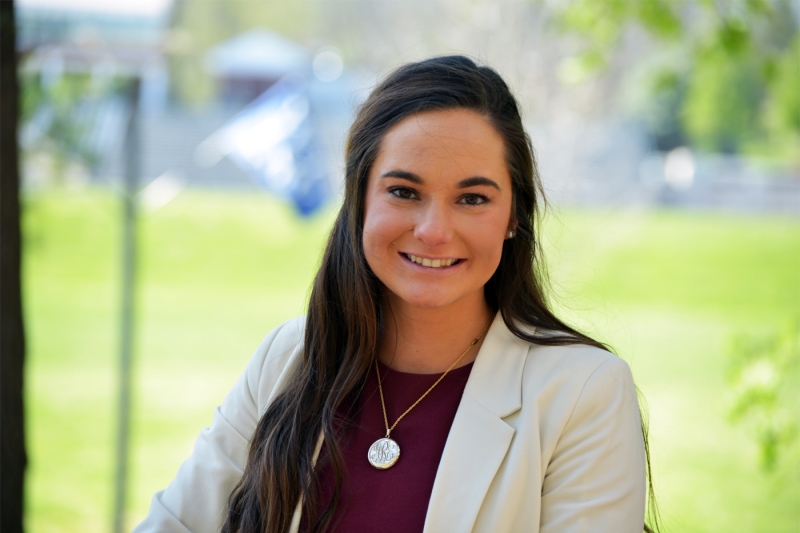Overcoming Barriers in the Refugee Protection Practicum Anne Rodgers '20, '23L writes about her experience using creativity and emotion in her work helping her client seek asylum.
Anne Rodgers ’20, ’23L is from Charleston, SC. She attended Washington and Lee University where she received a B.A. in Sociology. At W&L Law, she is a Managing Editor for the Journal of Civil Rights and Social Justice. She also teaches spin at Flex Fitness in downtown Lexington. Following law school, Anne will move to Atlanta, Georgia, to practice civil defense.
Why did you choose to participate in this practicum for your 3L year?
I chose to participate in this practicum because I love immigration law. I took Professor Baluarte’s Immigration Law class my 2L year and became fascinated with the subject. I then did an externship during my second semester 2L year working for a domestic violence attorney in Lexington who specializes in immigration law and U-Visas. Taking this class seemed like a natural progression in my study of immigration law. Although I will be practicing at a civil defense firm after law school, I plan on doing immigration law pro bono, and would specifically like to work with women and children who are seeking asylum in the United States.
What classes have prepared you to work in the practicum?
Immigration Law has been the most helpful – but Legal Writing and Legal Research also help for writing briefs! Asylum Law requires persuasive writing. I am constantly working with my client on how to tell her story to show that she meets the elements of asylum. We work together on how to develop a completely accurate and compelling narrative. I also think it is extremely important to honor her experience through telling her story in a respectful and impactful way. I want my client to feel heard. On this front, my externship really prepared me well for this practicum. As part of my externship, I helped interview survivors of domestic violence. I was able to use some of the techniques I learned through my externship with the client I work with now.
What are some skills you have developed in this course?
I feel like I am much better now at communicating and working with clients. I feel much more comfortable asking difficult questions and explaining the purpose behind these questions. Asylum Law covers very sensitive and personal topics, and it is difficult for clients to share information regarding horrific experiences. I have found that making sure the client knows that I am there to listen and to help her has helped in creating a comfortable, safe space. I think this skill will translate well into my actual practice.
What surprised you about the work you have done?
How much actually goes into an asylum application. There are so many different parts – the actual application, the brief in support of asylum, the evidence index, and the declaration – and all components take careful attention and effort. I feel like this class has really encouraged me to incorporate creativity and emotion into the law. For example, finding certain evidence and making certain arguments require creativity when the evidence is not readily available or the argument is challenging.
Initially, I was not sure how I was going to be able to pull together an entire asylum application in one semester. Professor Baluarte encouraged us to work on certain components of the application first, such as the declaration and evidence index, before writing the brief. I have incorporated the declaration and evidence index into the brief, and it is interesting to see how all aspects of the application come together.
What was your favorite aspect of your work with the practicum?
Working with my client! We meet a couple times a week and I really feel like we are a team working on her case. I really enjoy speaking with my client about things not related to her case – such as how her daughters are doing in school. She has had an amazing life – I feel so lucky to now be a part of it.
I also really enjoy working with my classmates and Professor Baluarte. We are able to work through problems that come up together, and my classmates always have ideas that I have not thought of. Professor Baluarte has really helped me develop the legal theory of my case, as well as helped me fine tune my writing and how to highlight the most important aspects of my application. I have learned so much about asylum law, specifically relating to domestic violence as well as other types of asylum cases. I love the mix of instruction and group brainstorming. The classroom feels like we are practicing together in a firm.
What was your biggest challenge so far?
The language barrier. I wish I spoke more Spanish so that I would be better able to communicate with my client, and this is something I plan to work on. However, I have had a fantastic experience working with an undergraduate student, Andrea Rojas, who translates for me. I wouldn’t have made any progress on this case without Andrea. Her translation skills have been invaluable, and she is able to pick up on cultural nuances that I sometimes miss.
Has this experience helped you figure out your post graduate plans, and if so how?
I am definitely going to incorporate immigration law into my practice. Right now, I plan on taking asylum cases as my pro bono work.
 Anne Rodgers ’20, ’23L
Anne Rodgers ’20, ’23L
You must be logged in to post a comment.